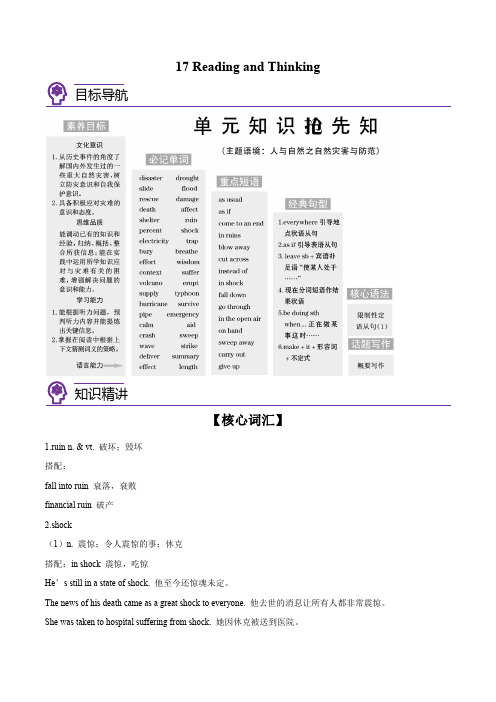高中英语必修一unit4-Reading
- 格式:ppt
- 大小:10.88 MB
- 文档页数:36






17 Reading and Thinking目标导航知识精讲【核心词汇】1.ruin n. & vt. 破坏;毁坏搭配:fall into ruin 衰落,衰败financial ruin 破产2.shock(1)n. 震惊;令人震惊的事;休克搭配:in shock 震惊,吃惊He’s still in a state of shock. 他至今还惊魂未定。
The news of his death came as a great shock to everyone. 他去世的消息让所有人都非常震惊。
She was taken to hospital suffering from shock. 她因休克被送到医院。
(2)vt.(使)震惊搭配:It shocks sb. to see/hear... 看到/ 听到……使某人震惊。
It shocked them to hear that he had gone abroad.听说他出国的消息,他们惊讶不已。
3.trap(1)vt. 使落入险境;使陷入圈套(trap—trapped—trapped)be/get trapped in 困在……中;陷入……中trap sb. into doing sth. 诱使某人做某事They were trapped in the lift. 他们被困在电梯里。
By clever questioning they trapped him into telling the truth. 他们用巧妙的提问诱使他说出真相。
(2)n. 险境;陷阱lay/set a trap(for sb.)(给某人)设下圈套fall/walk into a trap 落入圈套people caught in the unemployment trap 陷入失业困境中的人们If you choose this way,you’re likely to fall into a trap. 如果你选择这条路,你可能会落入圈套。




Unit 4 Natural DisastersPeriod 2Reading and Thinking教材分析该板块以“描述自然灾害”(Describe a natural disaster)为活动主题,要求学生通过阅读文本,了解我国20世纪70年代发生在唐山的大地震,学习报告文学这种纪实性文体的语言特征,最后完成用自己的语言描述自然灾害的任务。
该语篇文本没有报告文学中常见的中心人物,但按地震前、中、后的顺序向读者整体描述了唐山大地震这场灾难。
全文描写生动、包含情感,体现了作者想要表达“灾害无情,人有情”的思想感情。
教学目标1. 能正确理解使用下列词汇:ruin, percent, brick, metal, shock, electricity, trap, bury, breathe, effort, wisdom, context, suffer等。
2. 阅读描述重大灾害的纪实性报告文学语篇,掌握该类语篇的语言特征和叙事要点,能分析阅读语篇的文本结构。
3. 掌握在阅读中根据上下文猜测词义的策略;巩固合成词的相关知识;能运用构词法知识推测词义。
4. 从历史事件的角度了解国内外发生过的一些重大自然灾害,树立防灾意识和自我保护意识。
5. 能够了解和掌握一些与自然灾害相关的安全常识和防范措施。
教学重难点【教学重点】帮助学生掌握报告文学兼具文学性和纪实性的语言特征,让学生学会欣赏文本中所运用的修辞方法和写作技巧,理解作者在作品中所表达的情感和写作意图。
【教学难点】掌握在阅读中根据上下文猜测词义的策略。
教学过程Step 1 Warming-upHave a brief review of the natural disasters mentioned in news reports in Period 1. Discuss ingroups what can happen to a city during a big earthquake.设计意图:回顾上节课的内容,激活关于自然灾害和地震的背景知识。


Name Subject 英语Time Class TeachingtopicModule 1 Unit 4 Earthquake Using Language Reading and writingTeaching Aims I. Language and ability goal1. To make Ss master the new expressions about gratitude2. To make Ss realize the structure of a thank-you letter.II. Skill goals1. To train Ss’reading skills of understanding the meaning of some specific sentences as well as finding the detailed information2. To practice Ss’ summarizing skills based on the reading exercises3. To develop Ss’ speak ing ability and learn to express their own opinions4. To improve Ss’ writing ability based on all the language inputIII. Emotion, attitude and value goals1. To encourage Ss to be active in class and learn to cooperate with each other in group study2. To improve Ss’ ability to solve problems and to express their own opinions3. To strengthen Ss’ awareness of being grateful to others in lifeTeaching key points 1. Improve Ss’ learning English abilities, including reading, speaking and writing2. Strengthen Ss’ abilities to use the language to express their gratitude3. Lead the Ss to write a thank-you letter by using the expressions learned in the classTeaching difficult points 1. How to help Ss to master reading, speaking and writing skills2. How to guide Ss to write a thank-you letterTeachingaidsBlackboard, PPT and computerTeaching procedures TeachingStepsActivities AimsLead-in I. Zhang Sha phones Li Hua and ask him to check theEmail.II. Have Ss to read the Email.III. Thinking:Why did Zhang Sha write to Li Hua?1. Stimulate Ss’ interestand catch theirattention;2. Encourage Ss to readEnglish aloud3. Practice Ss’ability offast reading. Reading I. Reading comprehensionTask 1: Listening while readingHave Ss listen to the speech given by Li Hua.Task 2: Fast readingWhen did the earthquake happen?Was it a serious one? How do you know?Task 3: Detailed readingWhy did Li Hua say “All hope was not lost”?What did the soldiers do to help the Tangshanpeople?Who do you think made the largest contributions to1.Lead Ss tounderstand howserious the Tangshanearthquake was.2.Have Ss understandwho helped Tangshanpeople a lot.3.Motivate Ss tothe city of Tangshan?Task 4: Detailed readingHow did Li Hua express his gratitude in the speech? ➢______________ are strong enough to express our ________________________________.➢I do wish to _________________________ the people who have made great efforts to this earthquake rescue and city rebuilding..➢____ your love and help ____ made us stronger to come out from the sadness and overcome all the difficulties.➢Thank you ___ your coming/ listening/ consideration.II. Study and presentationTask 1: Study the thank-you letters in groups in two aspects: structure and expressions.Task 2: Have Ss to do the presentation about the result.What can you learn from the letters?Structure:____________________________________________________________________________Expression__________________________________________________________________________________________________________________ III.PracticeFill in the blanksDear Mr. Li,I’m writing to ________________(表达我对你的感激之情). I am now a freshman of Wuhan University, which I have dreamed about. Mr. Li, _________________ (我可以清楚地记得)the days when you taught me English. _________ (由于) your love and help my English have been improved greatly. However, ___________________ (曾经一度)the pressure of examinations, too much homework and the high expectations made me depressed. _______________ _____________(没有你的鼓励和帮助), I wouldn’t have a chance to go to university. I wish more and more of your students could achieve their dreams.__________________(再次表示真挚感谢)!Yours,Li Huaexpress gratitude tothe soldiers and theworkers and learn theexpression from thetext4. Practice Ss’ ability offind and study thetarget expressionswith clear purpose5. Encourage Ss to learnfrom reading andstudy in group work.Practice Ss’ ability ofsummarizing..6. Assess the learningoutcomesSpeaking I.QuestionsWho do you want to thank most in your life? Why?II. Invite some students to share their opinions 1. Encourage Ss to beactive in class2. Improve Ss’ ability toexpress their ownopinions;Writing I. Before writingMake a choice of the taskII. While writingIII. After writingPresent some students’ writingsEmphasize the expressions and the structureIV. Share the possible versions 1.Arouse Ss’ interest infinishing the writingtask2.Improve Ss’writing byadmiring others’ work3. Help Ss to appreciate what a good writing is.Summary I. What have we learned today?➢Expressions about thanks➢Structure about a thank-you letter➢Reading helps us with writing.II. Share the affection goals today.➢Courage to express oneself, especially one’sgratitude. Guide Ss to reflect on the class today.。



